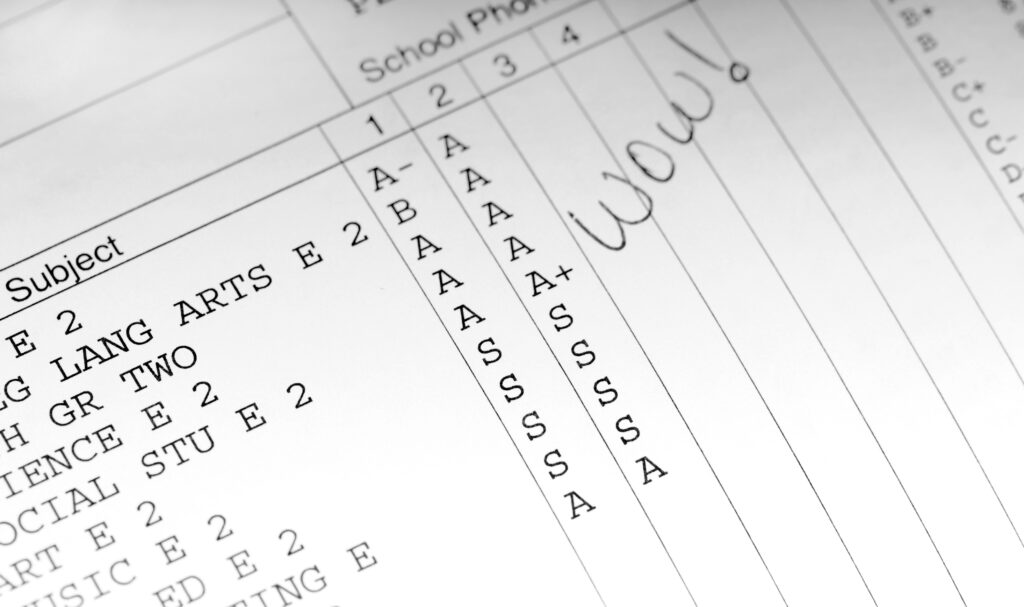Receiving an academic report card in high school can be a nerve-wracking moment. These days, whether it’s printed out, emailed, or posted online, there’s no escaping the moment of reckoning. Just seeing the notice, your adrenaline spikes, and thoughts begin to race. Before you know it, your mind is running away with a stampede of questions…
Will your grades reflect all the hard work you put in? Will this grade impact your future? And — if we’re being honest — will my report card spark any uncomfortable conversations at home?
It’s enough to raise anyone’s stress levels. We get it.
But here’s the truth: your report card isn’t just a verdict on your past. It’s a powerful tool for your future. It’s also important to understand the difference between progress reports (short-term grades) and your official transcript (semester or final grades). While report cards can feel high-stakes, your official transcript is what colleges will review during the application process. Therefore, each grading period is a chance to build your academic story. So don’t be scared: it’s time to grab this bull by the horns!
In this guide, we’ll walk you through 5 smart, empowering tips for report card season that will help you move forward, no matter what your grades look like today.
1. Understand your report card: It’s more than just a grade
If you’re already seeing red, just take a deep breath. Before we jump to conclusions or let the cortisol wreak havoc on your mood, take a moment to look carefully at what your report card is telling you.
Know the numbers, letters, and language
Every school has its own way of formatting report cards. Some use GPA scales, others use numeric scores and/or letter grades, and some include additional marks (like effort levels or behavior evaluations). Yes, it’s confusing. At the very least, if you can’t grasp everything, do your best to understand what the benchmark for passing versus failing each class would be.
But the most important part of getting a report card? Reading the whole thing!
Yes, words too. Don’t skip over the feedback or teacher comments — after all, they often provide insights that numbers alone can’t capture. No matter how confusing your marks are, your teacher can also communicate directly here. You might learn that your grade dropped due to late assignments, or that you’re excelling in participation, even if your test scores need work. Every bit of information sheds light on your performance.
Finally, try to stay calm enough to zoom out and look at the big picture. Pay attention to subject-specific trends and grading breakdowns. Did your final grade reflect stronger performance in the second half of the term? That could signal positive growth, which admissions officers love to see!
Avoid these common mistakes
- Don’t compare your grades to others. Focus on your own growth.
- Don’t ignore or dismiss teacher feedback. It reveals key insights.
- Don’t panic or give up. Your grades can improve with a plan.

2. Identify strengths and celebrate successes
It’s just human psychology — it’s easy to fixate on what went wrong. But your report card almost certainly has some bright spots, too. Don’t overlook them.
Positive feedback is your roadmap forward
Whether it’s a high score in math, a glowing teacher comment in English, or consistent participation in class discussions, remember these are strengths you can build on.
- Strong grades in certain subjects? That could help you identify potential majors or areas to pursue in college.
- Great feedback on work ethic or collaboration? That’s valuable language for letters of recommendation later. Pay attention to traits that are highlighted, and who sees your best qualities.
- Major improvements since your last report? Good for you! That’s a hard-won accomplishment.
You can think of these highlights as clues. They’re showing you not just where you’ve succeeded, but how you can keep growing and developing your story. After all, college admissions isn’t all about a 4.0 GPA. This video breaks down some of the other aspects that weigh into admissions decisions:
Your academic strengths could also become core themes in your personal essays. For example, consistent A’s in science might point to a natural future in STEM — and that organic interest can drive your application narrative.
Got a comment on your report card that you’re particularly proud of? Save screenshots or notes of strong comments. They might come in handy when you start drafting college essays or building your activity list. As we mentioned before, if you notice that one of your teachers recognizes your better qualities, that could end up being a good person to ask for a letter of recommendation later on.
3. Pinpoint areas that need work (without panicking)
Now that you’ve seen what’s working, it’s time to face what’s not. Let’s start with a case study.Here’s the story of Jamal, a new high school student who was able to leverage his report card to turn things around in math:
Struggling? It’s a starting line, not a failure
So, what did Jamal do right? Instead of seeing a low grade as a dead end, look at it as the beginning of a new strategy. Ask yourself what needs to change:
- Was this subject genuinely difficult, or were there external factors (like time management or distractions) that got in my way this semester?
- Did I seek help when I was stuck?
- Do I know where to go for help?
- Was this a one-time dip or part of a trend?
Once you’ve identified what’s going on, you can make a plan to address it. That might include:
- Meeting with your teacher for feedback
- Joining a study group or asking a friend to study with you
- Adjusting your schedule next semester
- Exploring tutoring support at your school or in your community
Don’t underestimate the value of a quick check-in with your teacher. Even a short conversation can give you insight into grading policies, assignment weight, or participation habits that you can improve quickly. Plus, it shows your maturity and initiative — qualities that make a difference in recommendation letters.
If you’re struggling in a particular subject, it really means that area needs some extra attention. Remember: Admissions officers often value improvement just as much as achievement. A student who struggles, adapts, and improves tells a more compelling story than one who coasts.
4. Turn your report card into a game plan
After you’ve done the first few steps and thoroughly read and understood your report card, it’s time to look towards the future. Grades by themselves aren’t goals. But you can turn them into goals — with the right mindset.
Of course, sometimes it’s easier said than done to move forward. If you’re stuck on how to break the ice, it’s hard to get past the report and onto the plan. This video has tips for how to handle your report card conversations as a family:
Short-term actions and long-term thinking
Once you’ve reviewed your report card, take time to write down 2–3 clear academic goals. Make them SMART: Specific, Measurable, Achievable, Relevant, and Time-bound.
Example:
- Weak Spot: Grade of C in Biology
- Goal: Raise to B by the next grading period by attending weekly office hours and completing all assignments on time
The specificity is key. And, you don’t have to wait until the next report card to see if your plan is working. Set calendar reminders to check in on your progress mid-way through the term.
Looking for more concrete advice for top students that you can put into action in the classroom tomorrow? Check out Empowerly’s Guide to Student Wellness, an ebook chock-full of tips on how to reduce stress and ace your high school years with style.

5. Take academic control before it’s too late
If you’re happy with your report card, that’s awesome! You’ve worked hard to get here. Keep it up and you’re on the right track.
But… What if your grades aren’t where you want them to be?
Planning beats worrying every time
Don’t let the stampede sweep you off your feet. Stay strong! This is your moment to shift from reaction to action. If you’re disappointed with your report card, don’t waste time with guilt or excuses. What matters is what you do next.
Here are a few actions you can take today:
- Meet with a counselor or academic advisor to discuss your trajectory
- Consider outside support, like tutoring, skill-building courses, or test prep
- Start building healthier study habits (earlier review, fewer distractions)
Your healthy study habits can be non-academic, too. Start by creating a weekly schedule, managing screentime, or organizing your workspace. These often help more than you think. Remember, colleges don’t expect perfection. They’re looking for students who take initiative.
Need help planning your comeback? Empowerly’s expert counselors can help you build a personalized academic roadmap based on your goals.

Your report card is a chapter — not the whole story
Yes, grades matter. Yes, colleges look at your academic record. But no, this one report card won’t define your entire future. What will?
Your ability to reflect, adjust, and take action. So, take a deep breath. Then take the next step.
If you’ve received a report card you’re less than proud of, don’t wait to see if you get back on track — take action now. Whatever the solution is, something needs to change; what you’ve done so far has gotten you here. It’s time to take the next step so you can reach your full potential.
Don’t just read your grades — rewrite your future
At Empowerly, we believe every student deserves expert support on the path to college. Our college counselors are the best-rated in the country and have proven to improve college admission rates by 11x. Whether you’re aiming for straight A’s or bouncing back from a setback, we’ll help you make your next report card your strongest yet, no matter what your starting point.
The next grading period is closer than you think. Book your free Empowerly consultation today — and let’s build your academic game plan together.
